#善哉
Text
不藏私食譜-關西的白玉善哉,沒有專用粉,沒有白玉粉也可用糯米粉代替
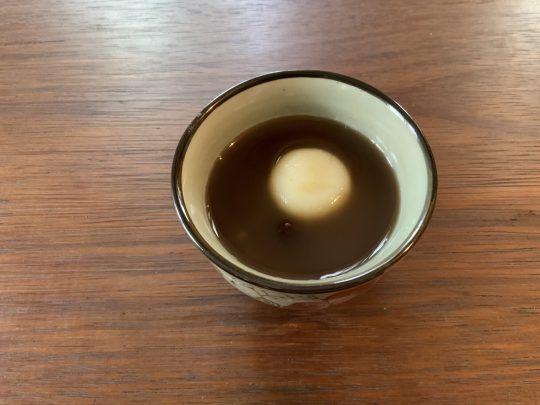
View On WordPress
0 notes
Photo

#白玉 #ぜんざい #善哉 #珈琲 #むぎの里 https://www.instagram.com/p/Cj62YVhSzFe/?igshid=NGJjMDIxMWI=
1 note
·
View note
Text



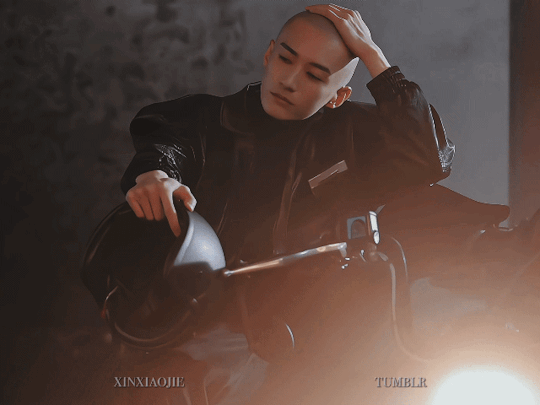
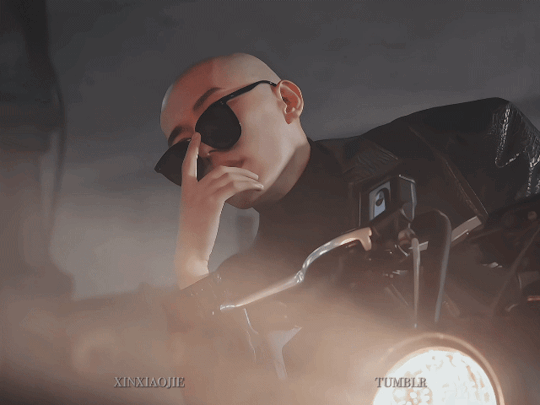
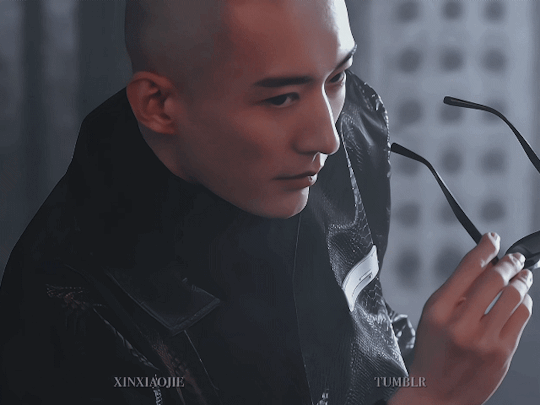
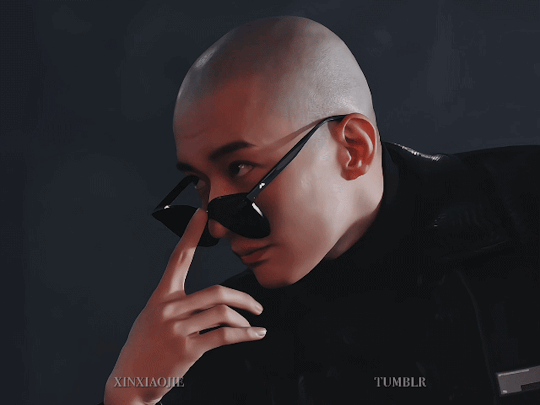

😎👨🦲🕶️🫸📿🏍
#少年歌行#the blood of youth#chineseartistsinc#shao nian ge xing#great journey of teenagers#youths and golden coffin#chinesemedia#liu xueyi#caps#wu xin#*****inaudible screaming about a monk on a motorbike*****#他不是无心他是有意的😩😩😩😤😤#prayer beads in one hand motorbike in the other 阿弥陀佛 善哉善哉#xiao se uses xinmoyin looking into my eyes and it's just this video on loop 💫 xiao se: what is wrong with her#all of these bike videos are in 240p for what reason??????? its 2023!!! give us the hologram projection!!!
394 notes
·
View notes
Text
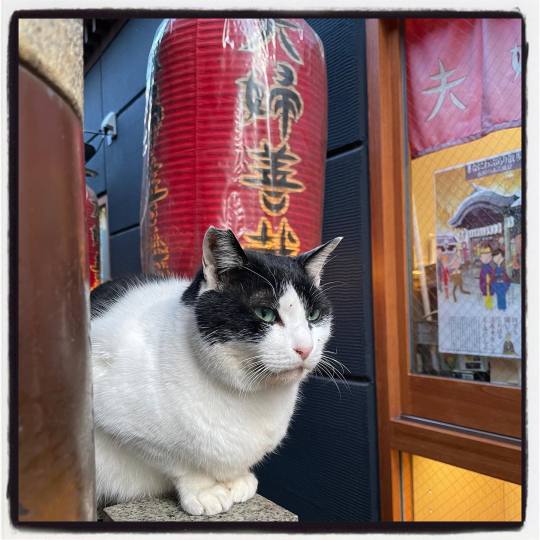
10 notes
·
View notes
Text
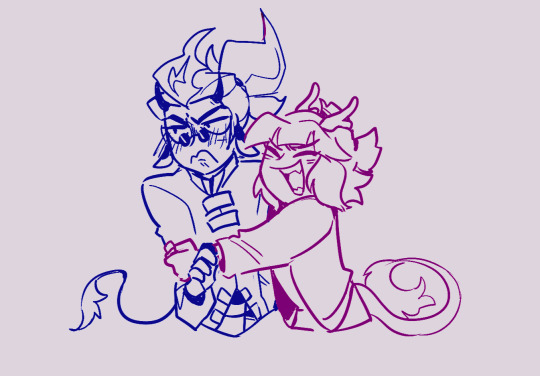
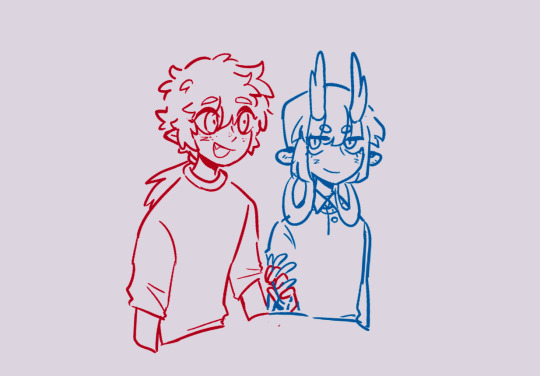
两款不同口味的小情侣
36 notes
·
View notes
Text
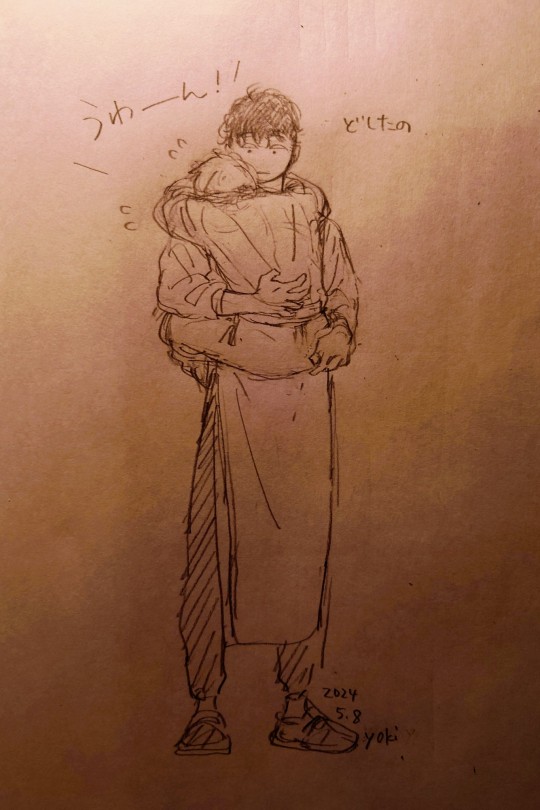
泣きたいときもあるんす
だけどそれは、負けたくない時なんす
くじけたくない時なんす
また明日も立ち上がるために、
今日はちょっと、肩を貸してください
0 notes
Photo

毎年恒例のお善哉。 今年は人数も多く賑やか😍 やっぱり人数多い方が楽しい🎵 今年は、ちゃんと型紙も仕上げて。 友達がお店を開いたのでチキンとキンパを買いに🏃♀️キンパ撮り忘れた😣 #伊勢型紙 #お善哉 #卯年 #ぴょんぴょん #飛躍の年 #プルコギキンパ #ココチキン #美旗駅付近 @ko_re_ko_so_chicken https://www.instagram.com/p/CntmdOjh71K/?igshid=NGJjMDIxMWI=
0 notes
Text
Scan and transcription of the Persona 3 part of Newtype Magazine February 2016
The only twitter account that's asked for permission to repost is krkmsr, so if you see it on anyone else's, they can't read! How nice.
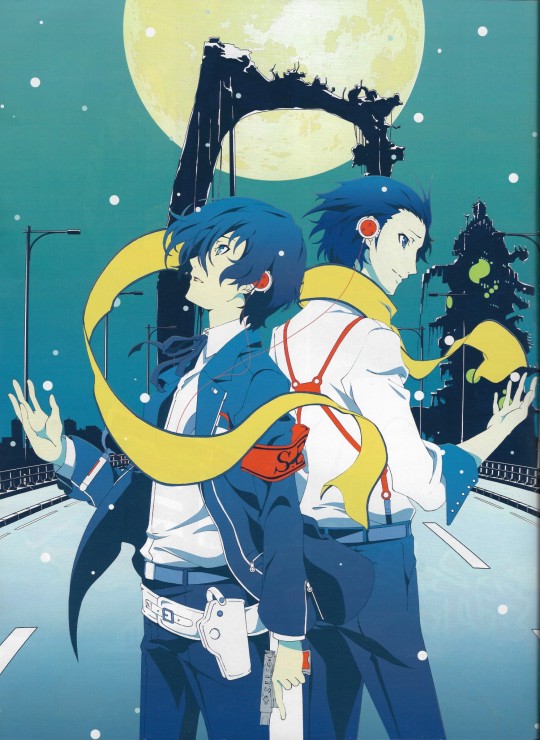

春、夏、秋を経て冬、理が出す答えを見届けて
監督 田口智久
死を見つめる季節のフィナーレに
第1章でコンテ、第2章で監督を務めてこられた劇場版「ペルソナ3」ですが、ファイナル・シーズンである第4章は、どのような気持ちで臨んだのでしょう?
田口 第3章で自分が監督としてかかわっていない劇場版「ペルソナ3」を見ることができたのが、刺激になりました。自分とはまったく違う方法論で構築されていて、僕がやったら確実にこうならないですし、なんというかジェラシーのようなものを感じまして。ああ、ペルソナって、こういうふうにつくることもできるんだ、と。それを受け止めることができたからこそ、第4章では、自分のやり方を突き詰めたフィルムにしなくてはと思いました。あとは、やっぱりフィナーレということでのプレッシャーが大きかったです。
第4章の物語の関となるのは?
田口 理と綾時の関係性ですね。そこヘシャドウの母体であるニュクスが襲来したり、それに伴ってみんなの心がダウナーになって⋯⋯という展開で、ずいぶん重いものになっています。でも、みんなが悩んでいる部分にしっかり尺を取って描いているので、映画ならではの見せ方ができているのでは、と思います。
理にスポットが当たっていきますが、どのように描きましたか?
田口 第3章に、理が旅館の池に落ちて笑うシーンがありますけど、あの理を経ての理をしっかり追っていこうと考えていました。今作では、抱えきれないほどの絶望を前に、悩み、立ち止まってしまうというところまで、みんなが落ちてしまうんですけど、そのなかで理が見つけ出す答えというのが、全4章通してのテーマでもあり、象徴的なセリフになっています。そして、それは、第3章で笑った理がいなければ、たどり着けなかった答えなんじゃないかな、と。
それから、綾時とアイギスも、重要な存在ですね。
田口 すごく極端な⋯⋯本当に超極端な言い方ですけど「綾時と理は両想い。アイギスは理に片想い」っていうのを、こっそり頭の片角に置いてました(笑)。もちろん僕独自の解釈なので、いろんなとらえ方をしてほしくもあるのですが。ただ、そうやって、アイギスがヒロイン然としているわけではないからこそ、ペルソナならではの仲間感が出る、というのもあるんですよね。
理と綾時に重点が置かれていくとなると、その二役を演じられている石田彰さんのアフレコもすさまじいものになったのでは。
田口 石田さんだけ別の週に理以外の綾時を中心とした声を録らせてい��だいてから、全体アフレコの週に理としてみんなといっしょに録らせていただいた感じなんですけれど、本当にすばらしかったです。演技に対するストイックさが本当にプロフェッショナルで、ご自身で「今のは少し綾時が出てしまったから」とリテイクを申し出てくださったり。
全体的にも、とてもスムーズなアフレコになったそうですね。
田口 圧倒的にスムーズでした。特に今回は静かなシーンが多くて、感情的にセリフを吐くような場面はほとんどないんですけど、その淡々とした空気感を成立させるのは難しいはずなのに、自然にスッとやってしまえるのがこのチームの方々の成せる技。こんなに研ぎ澄まされた現場は、なかなかないのではないかと。
細かな心情描写という意味では?画づくりにもこだわられたのでは?田口監督の描き出すダウナーな情景描写が楽しみです。
田口 カッティングが終わった後に、編集さんに言われたひと言が「暗っ!」でしたからね(笑)。刺されて死ぬとか大惨事が起こって死ぬとかのサスペンス的な死ではなくて、非常に観念的な死についての物語なので、精神的にどうやられていくかというのを、どう表現するかが課題で。光や色味の演出であったり、降ってくる雪の量で表現していきました。アニメで雪が降りつづけている作品もあまりないんじゃないかと思うんですけど、心情とマッチさせたいなあというところで、力を入れています。作画もすごいアニメーターさんたちが集まってくださっていて、誇張された動きというよりはリアル寄りの芝居をていねいに描いてくださっています。全然動いているように見えないところにも実は枚数が割かれていて、作画枚数もこれまででいちばん使っているんですよ。
最後に、今作を描くうえでの最大のポイントだったと考えるシーンを教えてください。
田口 ラストですね。それは第4章を担当すると決まったときから、見据えていたビジョンでもあります。第1章の春からともに季節を経てきた理と仲間たちが迎える、そのラストを見届けてほしいです。
#1 Spring of Birth
1日と1日のはざまに隠された影時間。そこにはびこる怪物・シャドウに襲われて、無気力症となってしまう者が町に続出していた。対抗できるのは、ペルソナという特殊な能力をもつ者だけ。春、私立月光館学園に転校してきた結城理は、ペルソナの力に覚醒し、同じくぺルソナの力をもつ者たちが集う特別課外活動部へと引き入れられる
#2 Midsummer Knight's Dream
夏休みに屋久島旅行に向かった特別課外活動部。そこでアイギスという女の子に出会う。彼女は対シャドウ特別制圧兵装のラストナンバーであり、なぜか理のそばにいることを望むのだった。理たちは影時間の謎を追いながら、さらに新たな仲間と出会い、きずなを深めていく。だがそこにストレガと名のる者たちが現われ⋯⋯
#3 Falling Down
季節は秋。特別課外活動部は、影時間を終わらせるため、シャドウや滅びを望むストレガとの死闘を重ねていた。ある者は仲間や家族の死と向き合い、ある者は護るべき者に気づき、ある者はこれまでの戦いの意味に葛藤する。そんなとき、理の前に謎の転校生、望月綾時が現われる。その出会いの先にあるものは⋯⋯
「PERSONA3 THE MOVIE #4 Winter of Rebirth」
●1月23日土全国ロードショー
●第3章Blu-ray&DVD 1月20日水発売
WEB▶http://www.p3m.jp/
Twitter▶@P3movie
illustrated by YUKIO HASEGAWA, finished by SAORI GODA
background by BIHOU, text by HITOMI WADA
©ATLUS ©SEGA/劇場版「ペルソナ3」製作委員会
STAFF 原作=「ペルソナ3」(アトラス) 脚本=熊谷純 スーパーバイザー=岸誠二 キャラクターデザイン=渡部圭祐 ペルソナデザイン=秋恭摩 プロップデザイン=常木志伸 色彩設計=合田沙織 美術監督=谷岡善王(美峰) 美術設定=青木薫(美峰) コンポジット&ビジュアルディレクター=高津純平 編集=櫻井崇 音楽=目黒将司、小林哲也 音響監督=飯田里樹 第4章監督=田口智久 制作=A-1 Pictures
CAST 結城理=石田彰 岳羽ゆかり=豊口めぐみ 伊織順平=鳥海浩輔 桐条美鶴=田中理恵 真田明彦=緑川光 山岸風花=能登麻美子 アイギス=坂本真綾 天田乾=緒方恵美 荒垣真次郎=中井和哉 イゴ ール=田の中勇(特別出演) エリザベス=沢城みゆき
#persona 3#p3#ryomina#that tag's deserved i think#'Ryoji and Makoto are in love with each other. Aigis' feelings for Makoto are unrequited'#insane
58 notes
·
View notes
Text
Peng Doesn't Like Farts

Fans of Lego Monkie Kid, as many of you may already know, Peng is based on an ancient monster king appearing in chapters 74 to 77 of Journey to the West (Xiyouji, 西遊記, 1592). In the end of his arc, he is trapped above the Buddha's throne and submits to Buddhism. But you may not know that this very same character appears in a later novel, The Complete Vernacular Biography of Yue Fei (Shuo Yue quanzhuan, 說岳全傳, 1684 CE; a.k.a. The Story of Yue Fei). Peng is exiled from paradise for ... and I'm not joking ... killing a stellar spirit for farting during the Buddha's sermon.
Chapter one of Yue Fei's biography reads:
Let’s talk about the Buddha Tathagata at the Great Thunderclap Monastery in the Western Paradise. One day, he sat on a nine-level lotus throne, and the Four Great Bodhisattvas, the Eight Great Vajra Warriors, the five hundred Arhats, the three thousand Heavenly Kings, nuns and monks, male and female attendants, all of the heavenly sages who protect the Dharma, gathered to listen to his lecture on the Lotus Sutra. His words were like flowers and precious jewels raining from the heavens. But, at that time, a star-spirit, the Maiden Earth Bat, who had been listening to the lecture from beneath the lotus throne, couldn’t bear it any longer and unexpectedly let out a stinky fart.
The Buddha was a great, merciful lord, so he didn’t mind even the slightest bit. But don’t sympathize with the Dharma protector above his head, the “Great Peng, the Golden-Winged King of Illumination,” whose eyes shone with golden light and whose back was a scene of auspiciousness. He became angry when he saw the nasty, filthy Maiden Earth Bat, and so he unfurled both his wings and dropped down to kill the spirit by pecking her on the head. The light-point of her soul shot out of the Great Thunderclap Monastery and went to the Lands of the East (China) in the world below to find a mother and reincarnate. She was reborn as a daughter of the Wang clan. She would later marry the Song Prime minister Qin Hui (1091-1155) and come to cruelly kill the righteous (i.e. Yue Fei) as a means to get revenge against today’s enemy. We will talk about this later.
Let’s return to the Buddha, who saw what happened with his all-seeing eyes and exclaimed, “Good! Good! It turns out that this is an episode of karma (cause and effect).” Then he called the Great Peng bird to come closer and shouted, “You evil creature! You already took refuge in my teachings. How can you not follow the five precepts by daring to commit such a horrible crime? I don’t need you here; you will descend to the mortal world to pay off your (karmic) debt and wait until you have fulfilled your work. Once that is completed, only then will I allow you to return to the mountain to achieve the right fruit (Buddhist merit).” The Great Peng complied with the decree, flying out of the Great Thunderclap Monastery directly to the Lands of the East to be reincarnated. We will stop here (translation by me).
且說西方極樂世界大雷音寺我佛如來,一日端坐九品蓮臺,旁列著四大菩薩、八大金剛、五百羅漢、三千偈諦、比丘尼、比丘僧、優婆夷、優婆塞,共諸天護法聖眾,齊聽講說妙法真經。正說得天花亂墜、寶雨繽紛之際,不期有一位星官,乃是女土蝠,偶在蓮臺之下聽講,一時忍不住,撒出一個臭屁來。我佛原是個大慈大悲之主,毫不在意。不道惱了佛頂上頭一位護法神祗,名為大鵬金翅明王,眼射金光,背呈祥瑞,見那女土蝠污穢不潔,不覺大怒,展開雙翅落下來,望著女土蝠頭上,這一嘴就啄死了。那女土蝠一點靈光射出雷音寺,徑往東土認母投胎,在下界王門為女,後來嫁與秦檜為妻,殘害忠良,以報今日之讎。此是後話,按下不提。
且說佛爺將慧眼一觀,口稱:「善哉,善哉!原來有此一段因果。」即喚大鵬鳥近前,喝道:「你這孽畜!既歸我教,怎不皈依五戒,輒敢如此行兇?我這裡用你不著,今將你降落紅塵,償還冤債,直待功成行滿,方許你歸山,再成正果。」大鵬鳥遵了法旨,飛出雷音寺,徑來東土投胎不表。
#Great Peng#Golden-Winged Peng#Peng#Great Roc#Journey to the West#JTTW#Sun Wukong#Monkey King#Lego Monkie Kid#LMK#Azure Lion#Demon Bull King#Yellow Tusk Elephant#Celestial realm#sworn brothrs#smelly farts#farts
169 notes
·
View notes
Text
Today, my nihongo no sensei asked me which was my "fave character" from Bleach. So, of course, I had to mention Byakuya. The thing is, that I've been learning kanji for some weeks now and even if I'm not expected to learn more than what she is giving us for N5 level, I really enjoy learning as many as I can. That includes N4 and N3 level ones (they aren't that hard, believe me). Therefore, I was able to write down Byakuya's name fully in Kanji: " 朽木白哉 ".
Now, because I'm a sucker for hidden meanings, we already know his name has a special (as Hisana does) one. The "Kuchi / 朽木" stands for "decay" and Ki/木 means "tree". As for his name, Byakuya/ 白哉 the combination forms "midnight sun" or "white light in the dark" or even "white night" (pretty abstract, but still beautiful and precise for his Hakuteiken technique/白帝剣).
Now, the little coincidence (it might be just a coincidence, believe me I'm just a beginner) I found is in the last kanji of his name : 哉. It is also used with the combination: 善哉 which both mean "well done" (pretty interesting if you think about Byakuya's obsession for perfection too) but also "Zenzai". Zenzai is a soup, that varies with every region. But in general is made of Azuki beans. And do you remember who wanted to cook Shiratama Zenzai for Byakuya in the "Honey Dish Rhapsody" novel? Yes, his beloved sister Rukia! 🥺💖


If it's just a coincidence I don't care, is still cute :P (But we all know how much Kubo likes to play with this hidden little easter eggs)
#sashi's nihongo experiences#bleach byakuya#kuchiki byakuya#byakuya kuchiki#rukia kuchiki#nihongo#bleach#learning japanese#remember I'm studying to N5
43 notes
·
View notes
Quote
日本人が規律を守るの、単に「恐るべき同調圧力」と、「法規範と善性をあまり区別しないから」であって、何かのきっかけがあれば一気に暴徒化するだろうと思っている。
Xユーザーの蝉川夏哉さん
30 notes
·
View notes
Text
善哉善哉。
#fixx201506 #シッポ追い #tailchaser #猫 #ねこ #ネコ #cat #cats #猫写真 #東京猫 #外猫 #地域猫 #ねこ部 #まちねこ #ネコスタグラム #猫好きさんと繋がりたい #nekostagram #catstagram #猫咪 #straycats #streetcats #catsofinstagram #gato #katze #고양이 #кошка #kucing #kočka #گربه

59 notes
·
View notes
Text
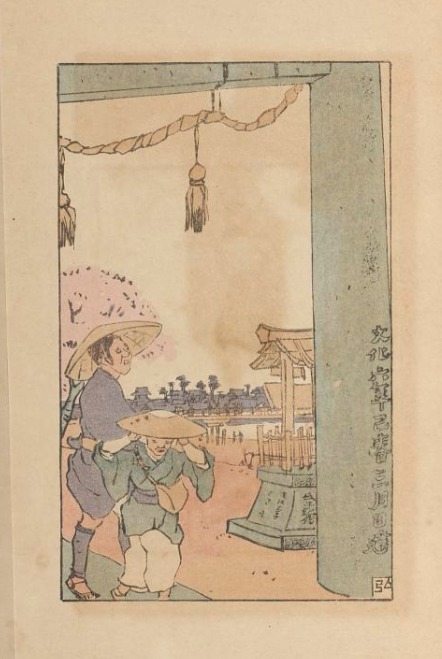
【かいわいの時】安永七年(1778)三月十日:蕪村、几菫、旧国の三人、夕暮れに桜宮を吟歩(『戊戌之句帖』)
安永七年三月九日、師の蕪村とともに伏見より昼舟で来板した几菫(きとう)は、翌日、俳友の旧国(ふるくに)も加えて網島に遊びます。句集『戊戌之句帖』には、次のように記されています。
十日 旧国と三人網島に遊び夕暮桜の宮の辺吟歩す
落ちかゝる雲を抱へて初桜
三ツふたつこぼるゝ雨や初ざくら
雨含む雲にけ高し初桜
とばかり案じ入て、今さら信徳が花の林にけをされて、中/\申出べくもあらず 又 都の春のにしきとは、常に聞ふるし見ふるしにたれば
難波津や桜の宮の柳哉
旧国は、姓は安井、名は政胤、通称は大和屋善右衛門の俳号。北革屋町に住し、飛脚問屋を営む。寛延3(1750)年家督を継ぎ、三都随一といわれるまでに家勢を盛りたてた(加藤定彦)。隠居後の享和元年(1801)に大江丸として刊行した『俳諧袋』は彼の第二句集ですが、そのなかで、蕪村のことを「生国摂津東成郡毛馬村の産」と記しており、これが毛馬村を故郷とする(蕪村以外の)唯一の証言となっています。しかし、この句集および第一句集『俳懴悔』にも、この時の句は収録されていないようです。
御大蕪村はとゆうと、安永七年二月の月例句会で
初ざくら其きさらぎの八日かな
と詠んだ句あります。弥生の桜宮ではどんな句を詠んだのでしょう。
(写真)中沢弘光「櫻宮(仮題)」。『畿内見物 大阪之巻』1912(スミソニアン蔵)挿画。
『畿内見物 大阪之巻』には高安月郊「蕪村の故郷」が収録されており、本画は二つある挿絵の一つ(もう一つは「網島」)。一の鳥居の内側から清湾を望み、大阪城・伏見櫓をとらえています。鳥居の刻銘には脱字があります。正しくは 「文化六年己巳春三月日建」。文化六年(1809)は蕪村が吟歩した31年後にあたります。
9 notes
·
View notes
Text
诗篇2
骐驎
铁蹄生焰尾拖尘,风行千里任骁腾。
重返美洲新大陆,不教自由缚缰绳。
甲午抒怀
飘零书剑意气豪,寰球比邻何曾遥。
我凭赤胆行天下,自信人间大爱曌。
感时
为祈天道叹倾危,仰天拊膺今古悲。
烈烈红祸国步窘,沉沉黑云世风歪。
此间莫要话政治,当朝工于钳人嘴。
但有压迫须反抗,砰然横空爆惊雷。
题秋瑾女士《黄海舟中》后(其一)
弹剑作歌归去来,承蒙大荒不弃□。
身陷涸辙千秋梦,心驰神州万里陲。
拯时在即当效力,匡世有需敢无为?
中华儿女多壮志,滔滔激浪问英才。
题秋瑾女士《黄海舟中》后(其二)
百年离乱云蔽晖,嗟我禹域多难灾。
铁枭屠亚颠成败,蟊贼窃国混是非。
连心手足顾疆藏,一体血肉念港台。
两字中华千钧重,力将狂澜再挽回。
纪梦
国梦悠悠预之先,借得神兵下九天。
卧龙抚剑殚多少,跃马请缨策八千。
东穷旭日瀚海际,西绝长风昆仑巅。
澄我华夏庄严地,再归林泉罔少年。
告同胞书
混沌歧途曳彷徨,天地人间两茫茫。
祚争沉浮尔马列,事关兴亡我炎黄。
虽有五鬼足乱华,再无紫阳可耀邦。
海外赤子多悲心,烈缺九评现光芒。
天龙赋
迎飙穿云居重霄,霄纵九亿万丈高。
磞硠滚雷震英雄,熠煜掣电曜天骄。
啸吟千峰兹气壮,腾舞半空此心豪。
为将真理扬东土,冲入瀛海鞭怒涛。
励志
皓皓白日曌青冥,壮思乘风万里行。
回望中原金雕举,来仪斯世彩凤鸣。
我有四海遍兄弟,我有五洲皆知音。
但使民约大归心,不向茅庐纸谈兵。
长城
东方有硕举世雄,巍巍筑我民族魂。
长河入海潮起落,神龙连天气吐吞。
下顾颓朝非盛世,此去险途更鹏程。
一念天下民之任,岂容邪教惑妖氛!
写怀
遗世佳人独立侠,对月起舞弄长铗。
蝇咂鼠攫不可赦,戾政邪治罪当伐。
振把新知革敝俗,奋将民权烨中华。
何当倚天诛毒龙,环球一家自由达。
元旦
一自洪荒划九州,悠悠五千春与秋。
眼中棋局已维谷,海内国运孰中流。
堪唾时弊不可救,幸喜宪政所同求。
万古霸史将翻去,人间巨作乃自由。
示友
大道难申展,党国非民国。
赤霾障目下,青天白日何?
感赋
涂足尘埃里,奉诗以鸣皋。
所有一腔爱,横天铸宝刀。
金石君致力基督传教有赠
漫漫远航启,如日方东隅。
国难堕泞淖,明德思琼琚。
不经砺与炼,怎配七尺躯。
加油好男儿,勠力天下须!
民觉
虐政如饕餮,夫子言无差。
四海豢走狗,五毛趋噪鸦。
楚楚鹰犬恶,堂堂鬼魅猾。
人非牛与马,习焉而未察。
天罚
皇军八千万,苏维之余埃。
在野备胎众,为官脑肠肥。
凶器“铁血”溅,巧言“环球”飞。
垂死猖狂甚,天灭红袍贼。
义愤
民之灾愆国之殇,一自马列驻我邦。
此心所欲天地鉴,为求日月复明光。
出塞
激流砥砺沧浪寒,奉请真理做心磐。
天道邪岂能压正,一马肝胆勇向前!
七绝其一
苛政不公民不平,恣睢无忌触怒霆。
请教国策求利器,复还乾坤清与明。
七绝其二
身隐兰皋漫修韬,把茗夜思中山樵。
前辈遗业忍轻弃,会当新华换旌旄。
七绝其三
大道夙夜为国筹,风骨甘为孺子牛。
有朝太平问世日,再看江山绘金瓯。
复友
……
绵延浩气承日月,激烈壮怀驱龙蛇。
已有先导千载拓,更需吾辈万里搏。
……
省思
噩梦未觉生亦灰,皦日惊破鸿蒙开。
万姓奴役身心木,举国愚化子孙哀。
百无一是唯党是,灭德立违诸善违。
披沥上陈斯微语,省察邪教真道哉。
天刑
莽荡龙战海天西,声振太霄众星移。
大爱无疆岂能灭,自由万岁不可羁。
怵惕酷政封民瘼,慷慨环宇兴义旗。
赤魔不除人类患,与天为盟共诛殛。
时闻有感
振臂有言疾一呼,除了翻墙无可抒。
朝嘉实话留学女,夕绥港星治下奴。
泱泱苏联复临世,浩浩航母又试浮。
堪叹我教洗脑功,激奋群情好模糊。
朝登岵岳
壮气玄黄弥太空,截峰为躯谷为胸。
身安荒峦迎风立,神飞长天与日横。
磨剑故园谢君伴,萃英九州知谁同。
历劫万千终不改,浮云安屈我昆仑。
暴政
街警执大棒,网民囿高墙。
镇内鞭其行,防外灭其想。
暗袭
孤立台交陷海峡,饮马香江踏荆花。
呼我九夏博大地,遭劫于此遏荒沙。
生辰
翠屏天降郁葱葱,久怀登临慕长松。
飞云瀑下绝壁挂,铁索栏外乱石奔。
遥知前路艰难甚,终须不空负此行。
临巘毋忘所来径,当谢千花祝东风。
赴杭州送友留洋西湖畔诸君索句
久已词笔疏红牙,为饯诸谊感梦华。
适过钱塘女儿墓,犹思灵隐山中茶。
永福党下无妙法,西湖依旧好烟霞。
此去玄奘朝圣地,听取自由大乘筏。
惊愤
逆党排华匪气骄,为逐蚁民借火烧。
帝都贫庶驱若狗,皇城幼儿虎口羔。
榨尽血汗赶将去,丧尽天良鬼辟谣。
低端上流祸政下,通国无人能幸逃。
怳惘
老幼不宁钓丝惊,其名美曰时代新。
国无人权拜于党,党有人权论在京。
猎鹿裹足饲恶虎,鱼肉哑口哺贪蝇。
往日“美帝”逢灾庆,今朝天朝盛会禁止评。
时评
为称霸主运深谋,第六国际大出头。
才宴政党号世界,又办网会曰全球。
厉鬼幻化讲人道,井蛙做梦说自由。
新装毕裸万邦贺,扫过流民一片愁。
倡义
巍哉中华有何缺,广有灵气多俊杰。
尔来全地蒙剧痛,如此苍生遭大劫。
岂可甘心侍宵小,决不认命屈妖邪。
天赋尊严与生俱,高举民权与之绝!
挞伐
红匪窃国为家私,蚁萃鸱张任所之。
盘踞宇内横戕虐,附体函夏悍鞭笞。
晦夜无光万恶聚,腐水久阴百孽孳。
今此罪贯满盈日,正是其命作古时。
维新
一派民怨载邦闾,正好升平庆无虞。
逆流到头文明唾,通衢无阻大势趋。
舆情旨在督失政,人权为保受害需。
万里长城凝众志,天命鼎新破旧局。
正道
红荒遗害盖地余,及时甘霖祛污泥。
光大初心星八万,昌明乾坤梦若而。
承恩天道仰人道,保障民生赖民权。
东方睡狮已苏醒,迎来春回诸焕然。
留迹于某老课本贴吧被删,外二首
生涯骨感忆蒙学,一片青壮叹老也。
睃眼个中之私货,摧残我等小花朵。
校内僵化国子监,校外魔鬼培训班。
一朝卒业淘汰去,可怜父母血汗钱。
逐梯应试至终端,出身娱乐儒林间。
承蒙红党再造恩,二考荣升公务官。
戊戌维权事件
明劫暗掠层盘剥,中华百姓不可活。
新揭千竿横幅起,上书尊严不可夺!
“新时代”之怪现状
朝呼故旧不应人,夕闻疯魔乱砍人。
何事人心荒如此!国本不国人非人。
白手套之死
民脂国库有鲸吞,输血魔窟掩真凶。
此间知情即是罪,为封其口灭帮佣。
国权抒
悉将土滨奉一人,五千高寿官欺民。
浩荡时势不可逆,天下为公��道行。
历史抒
故事因循未转机,万岁城头易王旗。
而有国蠹狂如此,是以苍生哀于斯。
挥散烟云氛埃肃,起看明阳光荣施。
昭昭民权天赋予,安排真知凝共识。
革命抒(之一)
百纪沉沦感苍茫,借天雷电破大荒。
人权无价民之本,法律至上国之梁。
不能安居遑论富,似此奴役何谈强。
亟起风云九万里,只认自由是吾乡。
革命抒(之二)
江山如此祸未休,如此江山能不忧!
萧条民生谁之过,飘摇国计党比周。
十载长歌述自省,百万劲旅呼同仇。
共举无敌新宪器,重把沉沦危局收。
民主抒(之一)
江山民主与旧殊,兴国公民须匹夫。
陆沉魔掌同胞难,长啸我闻轩辕哭。
来者宪政遍世界,去他马列归空无。
曙光新放诚在望,共传圣火煜吾族。
民主抒(之二)
安得剑斩冰崖消?滔天一震涨怒潮!
莽莽旧制寿当暮,朗朗新宪永如朝。
太息神州以吾爱,重整山河有旌招。
何以救国于万岁?唯此民主是航标!
董瑶琼
琼瑶小家女,义勇惭须眉。
墨泼魔王像,感召讨国贼。
时感口号
聊天监微信,发文删贴吧。
料得文革再,乐见贸易罚。
噩梦终憬悟,文明已萌芽。
欲自救个我,当共济国家!
Alita,观影
撒冷强食弱肉畸,降生沸汤烹肉糜。
上有铁律压与掠,下无人道诓更欺。
可喜姽婳渐已醒,非彼天坠不可医。
剑指魔王呼正义,还我日曜宇天熙!
年后杂言
万马齐喑哑,道路唯以目。
君可见数省打砸掘墓剖棺焚尸处?
君可见多地又现“红袖标卫兵”否?
苞谷贱粜七毛五,官家收去利饱足。
逼出田园挤入城,卖身为奴贡献十三五。
呜呼!一年总算完,衣锦还乡过个年。
年景多艰难,盼头依旧满春联。
一番麻醉休整再出发,如此年年复年年。
萧索最是今年节,冷清酒肉并烟火。
经济衰退薪尚欠,日子难过年易过。
无聊此心,何以填充?有快手抖音。
好个显摆晒满屏,好个治国法宝艳女唱后庭。
箴言(一)
痛将自由之炬搴,播撒火种向此寰。
先有个我觉人本,后有国家为多元。
党禁党虐且共产,民治民有更安澜。
通天无路沦地狱,起来人民解倒悬!
箴言(二)
前进进前步铿锵,唤醒久跪齐首昂。
我鞭愚蛮及全域,我歌文明跨五洋。
人手一票择优善,鼎足多党制嚣张。
神州不是奴隶场,可把此诗入宪章。
箴言(三)
暴秦积怨云怒号,欢呼宪政止旧朝。
自上而下粪蛆附,由下及上金沙淘。
党政军前人魔变,议政法侧现津桥。
国有救星乃民主,监缚霸权于笼牢。
箴言(四)
何当为国筑利闸?愿撷真理如是答。
能选能劾绝舞弊,敢言敢抗有鞭挝。
巍巍权利不可犯,浩浩尊严岂能铩。
山河有缺穹未补,持此金石祭女娲。
反歌
千年陈尸诗剑剖,荣把天光长歌讴。
识破满朝画皮伎,引进普世之嘉猷。
西去东物堪对等,东来西物难比侔。
人间万般多良友,除却暴政是仇雠。
民歌
民有祖国无安居,身在中华沦陷区。
上奉狼道唯霸凌,下好奴性惯阿谀。
天降春雷惊蛰启,法授自由不再拘。
平权等利同机会,挽起新政塑旧墟!
凯歌
为安天地日月挟,崛起义师伐纣桀。
弱水三千黜左术,只取一瓢尊宪哲。
若不天下为己任,何来权利履民责。
至道所向声响应,挝鼓助捷振金铎。
国歌
蒙羞文明外,雪耻以开蒙。
公民只两字,合格鼎万钧。
“扫黑除恶”运动
大厦将倾倩谁扶?巧立名目此蛊毒。
一刀劫富一刀霸,恫吓阶下亿万仆。
偶感破格,寄言体制内者
振兴终须覆弊制,维新首当革愚思。
一梦槐南犹未迟,共填地狱裂云石。
分权篇
为阻国政沦私房,析分三权相与防。
阿房不倒民不立,元首有约始敦煌。
制军篇
非王非党非军阀,军权坼政分而辖。
虎狼阅兵意威慑,可怜屁民难自拔。
平等篇
贫富无所限,官民同此标。
机会为我备,权益向我昭。
民主篇
西方传公器,乃器千古磨。
蠹政明镜鉴,害民宝剑觉。
因之自由瀚,是以尊严峨。
江山谁与主?民主天地谐!
人权篇
进为吴钩退兜鍪,吾权吾利吾政投。
公民法定磊而磊,尊荣天赋赳其赳。
千载专制满屈辱,一朝民主雪耻羞。
文明如日必普世,亚非拉与澳美欧!
选举篇
天下为公岂容侵,腾挪江山扼要津。
剔除国蛀肃妖党,自有栋梁出茂林。
官场即今去场字,天道只合正义赢。
民选公仆官亦民,联通昆仑与沧溟。
法制篇
瞻彼日月星三辰,辰列无上之昊穹。
天具设计故奥妙,国需创制始至臻。
巍哉法治替专断,壮乎指南司元戎。
但得人民获护盾,不吝雷霆使彰弘。
党竞篇
象为标志驴作徽,开放异见供栽培。
与民请命甄而选,为己服务滤以筛。
我票主我杜跋扈,他党排他防自肥。
国宪秉国安天地,先亡邪共大独裁!
自由篇
万世众望以宪镌,更始诗谱自由篇。
源于我思故杲杲,基于自治乃拳拳。
香江浣海值抗暴,玉山通天可申言。
唯有九夏尽解放,五洋归主济云帆。
宪政篇
神爱世人造亚当,东方一脉传炎黄。
祖登昆仑划舆地,两河上下兴家邦。
尔来四千八百载,莽荒旧制未曾改。
不得人之为人尊,生民但有奴与跪。
辛亥转机悲夭折,一朝赤魔侵我国。
江山遭劫无颜色,多少血泪流成河。
为救中华昏睡狮,天启普世真价值。
法治国家民主政,保障自由人权之。
新天有望须政宪,收拾山河新颜换。
十亿宝剑呼新人,一举击破邪灵散。
邪灵烟消纪元新,四海五洲皆朋宾。
生当昂首与阔步,日月昭焕文明旌。
弘新知为道正信为爱兮,天意诛伐。
驱逐百年来附国邪教兮,还我中华。
上赞美我天父上帝之大能与荣耀兮,
下讴歌我手足同胞联袂天下于一家。
破阵子·登阁
无主中原谁土,空嗟北西一陬。
苍生涂炭何以立,江山信美终难留。天地此恨悠。
犁新东土丰壤,汤风叱驭周求。
八千大刀镮铭志,十万云中军伴游。誓师从此楼。
浪淘沙
江山谁纵横,还在我氓。
夐古专制费长征。但得一朝民智启,虎跃龙腾。
天地人日臻,爱结同盟。
和平理性以争锋。不信朽木不倒耳,一举功成。
临江仙
故国沉睡悲胸臆,茫茫星暗云昏。
文明普世无西东。谁能遮旭日,一照天下同。
君有权利凛然也,觉醒即为战功。
海陆广大岁月洪。属我正之义,归我万民群。
小重山
毒蛛长线连中枢。日新洗脑网,君跳出。
亦如厉鬼画人肤。恶贯满,天谴必祛逐。
邪恶正义除!我思而自主,剑昆吾。
法尊民贵换舆图。自由者:有权如是摅!
南乡子
专政致愚迷,世有沉痼国有疾。
万般阴郁皆魔障,何医?除非行宪共传檄。
宪制信无敌,架海抟疆连八极。
炫燿辉荣弗远矣,可期,文明圣火永不熄!
酹江月
国脉如此,几人是、堪鸣不平英物。
隔断文明仇外界,深囿高墙网壁。
大谎瞒天,长鞭斫地,奴耻如何雪?
难得领袖,“公民”即是雄杰。
毋负万里山河,正千秋其时,智启蒙发。
世间新陈总代谢,除却正义不灭。
昭彰尊严,光大生命,快意冲冠发。
非痴语也,众志能举日月!
望海潮
依杳山岛,飘渺海蜃,激扬战浪惊潮。
牛斗冲天,鱼龙潜水,孰与斩鳄射蛟。
征帆需撼摇。望泱漭天际,万顷纤毫。
萧瑟秋风,涌起星月洗寒涛。
千古高歌离骚。解胸中块垒,岂是酒浇。
奔雷怒操,龙泉狂吼,羞与腐败同曹。
桀纣终一毛。有虹气吞吐,汗漫长飙。
异日波平海晏,骑鲸再遊遨。
沁园春
悲夫红朝,阴天晦夜,恶行邪藏。
是民受沥髓,驱为牛马,官之捶骨,养成豺狼。
求美不能,求真未允,求善何以制凶狂?
共人类,举倚天长剑,诛赤魔亡!
公民新知武装。看文明锦绣我东方。
但法替人治,爱必彪炳,民为国主,义必伸张。
解放自由,回归权利,巍巍众望劲且刚。
为明日,请宪政圣火,播扬华光!
满江红
世界潮流,纵歧阻、天与捭阖。
唤神州、十亿儿女,铸心伏魔。
山河呼应群情伟,日月添助中肠热。
速醒觉、解脱此幽笼,冲天鹤。
邪教冤,凭爱雪;专制恶,以宪灭。
引人间真谛,弘传情切。
千载屈膝祈硬骨,百年奴役盼活血。
谢云龙、腾起大纪元,风雷烈。
水调歌头
腾转风云翼,周览我河山。
抟扶直上,极目九万里方圆。
因之庄严上意,而有可为人事,耳畔忽鸣鸾。
大道虽漫漫,秉心犹可攀。
开鸿烈,创新制,补缺残。
中华鼎兴在望,紫气氲威严。
余既滋兰九畹,又树蕙之百亩,不问但顺天。
相信以此爱,赢得寰宇安!
5 notes
·
View notes
Photo
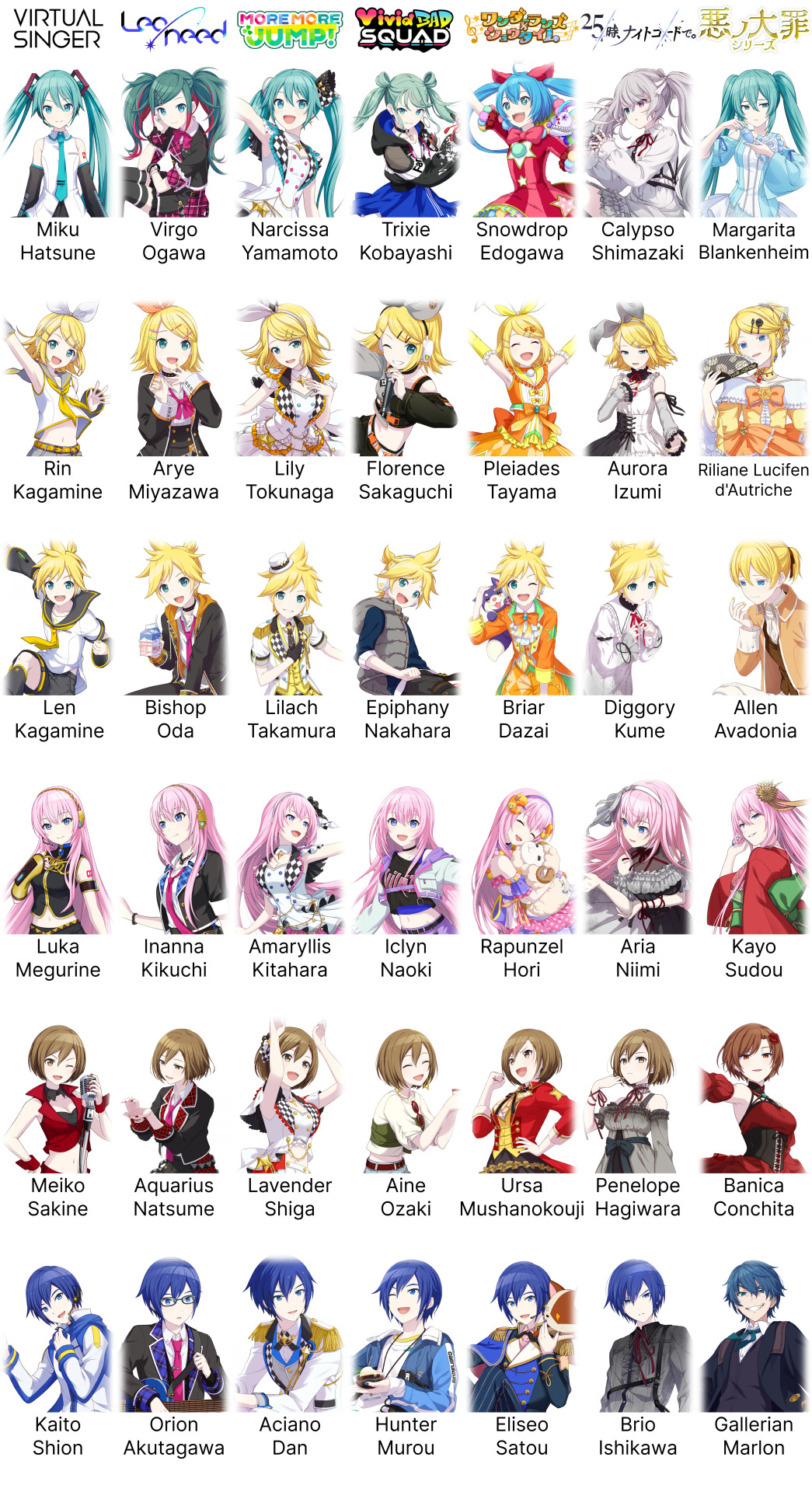
When you wake up one day and had the silly idea to give names for every virtual singer in Project Sekai (except the original and Aku no Taizai Series)
First Name Theme:
Leo/need: Constellation
MORE MORE JUMP!: Flowers
Vivid BAD SQUAD: Seasonal-themed names
Wonderlands x Showtime: Disney protagonists
25-ji, Nightcord de.: Member's center conflict or special skill
Surname Theme: Japanese writers, specifically from Bungou to Alchemist
And now with name meaning rambles:
Leo/Need
Miku: Virgo Ogawa
Virgo is the Western equivalent of the Babylonian "The Furrow" (ASBIN) and representing the goddess Shala and her ear of grain. One star in this constellation, Spica, retains this tradition as it is Latin for "ear of grain", one of the major products of the Mesopotamian furrow. For this reason the constellation became associated with fertility. Leo/need Miku's first event card is during "Singing Among the Cherry Blossoms" which mostly centers around Ichika in her attempt in being more confident. Starting that moment, Ichika flourish into the singer we know.
Ogawa is taken from Ogawa Bimei (小川未明), the writer of Red Candles and the Mermaid (赤い蝋燭と人魚), The Moonlight and the Glasses (月夜と眼鏡), Wild Rose (野薔薇), and A Telegraph Pole and A Weird Man (電信柱と妙な男).
Rin: Arye Miyazawa
Arye is another name for the Leo constellation, called by the Jews. The constellation Leo is the Western equivalent of the constellation was called the "Great Lion" (UR.GU.LA) in Babylonian astronomy. The bright star of the constellation, Regulus, is also knows as "the star that stands at the Lion's breast." and had distinctly regal associations, as it was known as the King Star. Leo/need Rin's first appearance is during "Unnamed Harmony" which centers around Saki's struggles in making song. However, as Shiho had said, Saki had been helping everyone by being herself and be the first one to figure out the feelings they want to say. Thus, making Saki the central "star" of the ban, similar to Regulus's status as "the star that stands at the Lion's breast."
Miyazawa is taken from Miyazawa Kenji (宮沢賢治), the writer of Be Not Defeated by the Rain (雨ニモマケズ), Night on the Galactic Railroad (銀河鉄道の夜), The Restaurant of Many Orders (注文の多い料理店) and The Wind Child Matasaburou (風の又三郎).
Len: Bishop Oda
Bishop is a masculine name of English and Greek origin, from the word epískopos, meaning "overseer". In Babylonian star catalogues, "The Overseer" or "The God Pabilsaĝ" (PA.BIL.SAG) has a Western quivalent; Sagittarius. Pabilsaĝ was a Mesopotamian god. Not much is known about his role in Mesopotamian religion, though it is known that he could be regarded as a bow-armed warrior deity, as a divine cadastral officer or a judge. He might have also been linked to healing, though this remains disputed. Leo/need Len's first appearance is during "Putting Feelings into Words" where Honami takes the role of "overseer", the first one who noticed Shiho doing things behind their back and overall being the one in charge in taking care to her bandmates.
Oda is taken from Oda Sakunosuke (織田作之助), the writer of Hurray for Marriage (夫婦善哉) and The Paradox of Youth (青春の逆説).
Luka: Inanna Kikuchi
Inanna or the "Lady of the Heaven" (A.NU.NI.TUM) is one of the Babylonian constellation that compossed the western Pisces, along with "the great swallow" (ŠIM.MAḪ). Inanna is an ancient Mesopotamian goddess of love, war, and fertility. She is also associated with beauty, sex, divine law, and political power. In Inanna's Descent into the Underworld, Inanna perceives that Dumuzid, her first and primary consort, has failed to properly mourn her death and, when she returns from the Underworld, allows the galla demons to drag him down to the Underworld as her replacement. Inanna later regrets this decision and decrees that Dumuzid will spend half the year in the Underworld, but the other half of the year with her, while his sister Geshtinanna stays in the Underworld in his place, thus resulting in the cycle of the seasons. Leo/need Luka's first event card is during "Stella After the Rain" that centers around Saki wanting to do more for the band, especially after being sick for a long time. The change of the season in Inanna Underworld myth can represent her unstable health.
Kikuchi is taken from Kikuchi Kan (菊池寛), the writer of Beyond Love and Hate (恩讐の彼方に) and Madame Pearl (真珠夫人).
Meiko: Aquarius Natsume
Aquarius is identified as "The Great One" (GU.LA) in the Babylonian star catalogues and represents the god Ea himself, who is commonly depicted holding an overflowing vase. In Old Babylonian astronomy, Ea was the ruler of the southernmost quarter of the Sun's path, the "Way of Ea", corresponding to the period of 45 days on either side of winter solstice. Aquarius was also associated with the destructive floods that the Babylonians regularly experienced, and thus was negatively connoted. Leo/Need Meiko's first appearance is during "Don't Let Doubts Hold You Back" which centers around Honami standing up for herself. Her pacifist nature can be seen as both good thing and bac thing, whether becoming the middle voice of the group of seen as two-faced, similar to the nature of water used in irigation or bringer of floods.
Natsume is taken from Natsume Souseki (夏目漱石), the writer of Kokoro (こゝろ), Botchan (坊ちゃん), and I am a Cat (吾輩は猫である).
Kaito: Orion Akutagawa
In the Babylonian star catalogues, Orion is the Western equivalent to The Heavenly Shepherd or True Shepherd of Anu constellation (SIPA.ZI.AN.NA). Anu being the chief god of the heavenly realms. The Babylonian constellation is sacred to Papshukal and Ninshubur, both minor gods fulfilling the role of 'messenger to the gods'. Leo/need Kaito's first appearance is during "A Bright Future!!" which center around Ichika who wants to share her feelings through her lyrics, to be more confident in expressing through songs.
Akutagawa is taken from Akutagawa Ryuunosuke (芥川龍之介), the writer of Rashoumon (羅生門), Hell Screen (地獄変), and Cogwheels (歯車).
MORE MORE JUMP!
Miku: Narcissa Yamamoto
Narcissa is a girl's name of Greek origin, meaning "daffodil." Daffodils symbolize new beginnings and rebirth–two characteristics that perfectly represent the new year. MMJ Miku's first event card is during "The Tomorrow We Hope For". The name can represent MMJ's whole journey; Haruka, Airi, and Shizuku having a renewal/rebirth as a new group idol along with Minori and her endless hope.
Yamamoto is taken from Yamamoto Yuuzou (山本有三), the writer of Towards the Truth (真実一路), A Woman's Life (女の一生), and A Stone by the Roadside (路傍の石).
Rin: Lily Tokunaga
Lily had two meanings: one as a sign of purity and magnificent beauty, and the other as a symbol of rebirth or resurrection. MMJ Rin's first event card is during "Time to RE:START!" which focuses of the group trying to find a way to get into the idol industry (you can say for their 'rebirth).
Tokunaga is taken from Tokunaga Sunao (徳永直), the writer of The Sunless Street (太陽のない街) and The Whole Family Works (はたらく一家).
Len: Lilach Takamura
Lilach is a version of the word "lilac". It is stronger and more masculine so it works well as a boy's name. Although lilac flower stands for renewal and confidence overall, each color of lilac has its own specific meaning. White lilacs represent purity and innocence, while purple lilacs symbolize spirituality. If the blooms edge more on the blue side of the color wheel, they symbolize happiness and tranquility. Magenta lilacs symbolize love and passion. MMJ Len first appearance is during "Happy Lovely Everyday!" which focuses on Airi's view on her past and present and how Airi from back then and now is really is the same.
Takamura is taken from Takamura Koutarou (高村光太郎), the writer of The Journey (道程) and Chieko's Sky (智恵子抄).
Luka: Amaryllis Kitahara
Amaryllis flowers are believed to mean pride, strength and determination as they stand tall above all other winter blooms. Amaryllis is also a Greek name which means 'to sparkle'. MMJ Luka's first appearance is during "My Color!" which focuses of Shizuku standing up as her own self instead of what the public wants to see.
Kitahara is taken from Kitahara Hakushuu (北原白秋), the writer of Paulownia Flowers (桐の花), Heretics (邪宗門), and Platinum Top (白金の独楽).
Meiko: Lavender Shiga
Lavender flowers tend to have a soothing effect on the surroundings. Lavender brings peace and harmony to the interactions between loved ones and is often considered a symbol of happiness, love, devotion, and protection. MMJ Meiko's first appearance is during "You Deserve It! Break Time!" which focuses on Shizuku in finding ways for Haruka to take a break, but this can also represent Haruka's love and devotion toward MMJ which is why she's working hard for them and managed to find "harmony" in her times.
Shiga is taken from Shiga Naoya (志賀直哉), the writer of Dark Night's Passing (暗夜行路), At Kinosaki (城の崎にて), Reconciliation (和解), and The Shopboy's God (小僧の神様).
Kaito: Aciano Dan
Aciano is a unique name that means "cornflower" in Spanish. This Mediterranean native flower represents natural beauty and the circle of life, and is often used to symbolise positive hope for the future. MMJ Kaito first appearance is during "MORE MORE Making Christmas" which centers Minori and her hope to get even better and spreading hope to the world as idol.
Dan is taken from Dan Kazuo (檀一雄), the writer of Man of a Burning House (火宅の人) and Dazai Osamu: The Novel (小説 太宰治).
Vivid BAD SQUAD
Miku: Trixie Kobayashi
Trixie is a name of Latin origin meaning "she who brings happiness." VBS Miku's first event card is during "Sekai Happy New Year". She's the only one who has no direct relation to a season, however this can be taken as each season can bring a certain happiness toward different people. This also represent VBS and how each and one of them brings happiness toward each others in their pursuit of their one dream.
Kobayashi is taken from Kobayashi Takiji (小林多喜二), the writer of The Crab Cannery Ship (蟹工船), The Absentee Landlord (不在地主), and Life of a Party Member (党生活者).
Rin: Florence Sakaguchi
Florence is a feminine name of Latin origin that comes from the word florentius which means "blossoming," "flourishing," and "prosperous," making it a wonderful choice to inspire good fortune for baby throughout their life. VBS Rin's first event card is during "Awakening Beat" which focuses in Kohane (whose name is related to the spring season) gaining more confidence in singing.
Sakaguchi is taken from Sakaguchi Ango (坂口安吾), the writer of Professor Blowhard / Professor Wind (風博士) and Under the Blossoming Cherry Trees (桜の森の満開の下).
Len: Epiphany Nakahara
Epiphany is a typically masculine name of Greek origin that means "bringing light," "manifestation," "striking appearance," or "vision of God." The name comes from the Greek word epiphaneia, which means "a sudden realization or feeling." In Ancient Greece, epiphanies were usually representative of visions of gods and were normally reported during troubling times. VBS Len's first event card is during "Nocturne Interlude". Looking for a name related to the winter season for Touya, this name can represent to Touya's shift to street music, but also represent the realization his and his father's love for music albeit in different ways.
Nakahara is taken from Nakahara Chuuya (中原中也), the writer of Poems of the Goat (山羊の歌), Songs of Bygone Days (在りし日の歌), and Upon the Tainted Sorrow (汚れつちまつた悲しみに…)
Luka: Iclyn Naoki
Iclyn is a name of Welsh origin that comes from the word ice and means "compassionate".VBS Luka's first appearance is during "Same Dream, Same Color" which mostly focuses on Touya (whose name is related to winter season) and his bonds with his friends.
Naoki is taken from Naoki Sanjuugo (直木三十五), the writer of Chronicles of the Peaceful South (南国太平記), Battle (合戦), and Kusunoki Masashige (楠木正成)
Meiko: Aine Ozaki
Aine is a traditional Irish name that is tied with the Celtic goddess of summer and prosperity, means 'happiness and success'. VBS Meiko's first event card is during "Singing in Sync" which focuses on An's (whose name related to summer season) and her view of the 'success' in being partners which becomes their crisis and later evolve to how An see her own crisis of looking for 'happiness and success' when she was feeling left behind.
Ozaki is taken from Ozaki Kouyou (尾崎紅葉), the writer of The Golden Demon (金色夜叉), Tears and Regrets (多情多恨), and Love Confessions of Two Nuns (二人比丘尼色懺悔)
Kaito: Hunter Murou
Hunter is an English name, meaning 'pursuer.' This name reflects the age-old role of the hunter and gatherers. VBS Kaito's first appearance is during "Stray Bad Dog" event which focuses on Akito (whose name is related to autumn season) and all of his hardworking attempt in fulfilling his dream after a lost.
Murou is taken from Muroo Saisei (室生犀星), the writer of Lyric Pieces (抒情小曲集) and Love Poem Collection (愛の詩集)
Wonderland x Showtime
Miku: Snowdrop Edogawa
Snowdrop is one of the translations of the Snow White's name. Snow White from Snow White and the Seven Dwarfs (1937) is the first Disney Princess, the first main character, and the first heroine of a Disney animated feature. Snow White is well known for her kindness and optimism — both of which act as her greatest strengths, as they've guided her safely through the various hardships faced throughout her life. She can also be assertive, with the authoritative nature of a mother. In addition, she showed leadership potential when guiding the animals around the house during their cleaning session, successfully instructing them on how to best clean the house and various items inside. WxS Miku's first event appearance is during "Run! Sports Festival! Committee Rush". Emu, being one of the main star of the event, is shown to have the skill to influence people with her cheerfulness, big heart, and love of smiles. Her optimism in a way is similar to Snow White for they always find a way to reach their goal, even if it's as simple as "finding a safe place to stay" for Snow White or "making a festival filled with smile" for Emu.
Edogawa is taken from Edogawa Ranpo (江戸川乱歩), the writer of The Case of the Murder on D Hill (D坂の殺人事件) and The Fiend with Twenty Faces (怪人二十面相).
Rin: Pleiades Tayama
Pleiades, or The Seven Sisters, is the name of seven star cluster close to the constellation Taurus. It is also the middle name of Jim Hawkins, the protagonist of Disney's Treasure Planet (2002). Jim is an adventurous young lad; rebellious, strong-willed, brave, caring, and loyal. A bad boy with a heart of gold. However, he has his insecurity, wondering if he can't do anything right. Finding treasure planet is his calling to finally fix something. WxS Rin's first Wonderland x Showtime centric event appearance is during "Wonder Magical Showtime!" where Tsukasa put aside his desire to win the whole PXL's competition in order to make Emu's dream come true. Tsukasa and Jim is almost similar, from their desire of something more (Tsukasa with his future star dream and Jim desire for adventure) but has insecurities and pulled them away from truly expressing themselves.
Tayama is taken from Tayama Katai (田山花袋), the writer of The Quilt (蒲団) and Country Teacher (田舎教師).
Len: Briar Dazai
Briar (Rose) is an alias for Princess Aurora is the titular character of Disney's Sleeping Beauty (1959). Aurora is a kind, elegant, graceful, angelic, loving, and gentle person, as well as a hopeless romantic. At first, she is seen as a slightly shy, playful and carefree young woman as a result of being sheltered for most of her life. Aurora is very loyal and honest to her "aunts" and usually obeys their rules respectfully, even though she may disagree with them. WxS Len's first event appearance is during "Smile of a Dreamer" which focuses in Emu and her attempt in making her grandpa's vision. Both Emu and Aurora are dreamers even though the situations push them down (Emu with her brothers, Aurora with her royal status), but in the end both of their dream comes true with the help of many. Coincidentally, Emu's event song and Sleeping Beauty's theme song is titled "Once Upon a Dream".
Dazai is taken from Dazai Osamu (太宰治), the writer of No Longer Human (人間失格) and Run, Melos! (走れメロス).
Luka: Rapunzel Hori
Rapunzel is the protagonist of Disney's Tangled (2010). A dreamer at heart, she's a spirited and determined young woman. Because of her sheltered up bringing, she can be rather anxious and having a low self-esteem. However, that doesn't stop her from stepping out her comfort zone and take on the unknown for the sake of experiencing her dreams. Despite being fearful and at times hesitant, she pushes herself forward to pursue her ambitions. WxS Luka's first Wonderland x Showtime centric event appearance is during "Mermaid Admiration". Both Nene and Rapunzel stepping up to finally fulfilling their dream, and now they're looking for a new dream.
Hori is taken from Hori Tatsuo (堀辰雄), the writer of The Holy Family (聖家族), The Wind Has Risen (風立ちぬ), and Naoko (菜穂子).
Meiko: Ursa Mushanokouji
Ursa Major is a constellation in the northern sky, whose associated mythology likely dates back into prehistory. Ursa Major is primarily known from the asterism of its main seven stars, which has been called the "Big Dipper", "the Wagon", "Charles's Wain", or "the Plough", among other names. In particular, the Big Dipper's stellar configuration mimics the shape of the "Little Dipper". Dipper is also the name of the main character in the Disney TV Series Gravity Falls (2012-14). Dipper is a adventurer, clever, curious and may be a bit short-temperament. Throughout the series Dipper becomes more confident in himself, has learned to have hope in the doubtful times, and become stronger when facing his enemies to stand up for what he believes in. WxS Meiko's first appearance is during "On This Holy Night, I Sing" where Nene slowly grows confident in herself once again on stage, similar to Dipper's growth.
Mushanokouji is taken from Mushanokouji Saneatsu (武者小路実篤), the writer of Good-Natured Person (お目出たき人) and Friendship (友情).
Kaito: Eliseo Satou
Eliseo has the meaning "God is my salvation", which is in line with Elizabeth that means "My God is an oath" or "My God is abundance". Elizabeth itself can be derived into Elsa, which is a name of the deuteragonist from Frozen (2013). When she was little, Elsa was still quite playful and used her magic to have fun and goof off. However, after accidentaly hurt her sister, she became terrified of losing control and chose isolation for other's protection. WxS Kaito's first event appearance is during "It's On! Wonder Halloween!" where Rui's robot accidentaly hurt Tsukasa, thus he hold back with his more daring idea, similar to Elsa. It was only after Tsukasa reasured Rui that Rui can return as his confident self, in a similar way how Anna tells Elsa that she loves her that Elsa can return summer.
Satou is taken from Satou Haruo (佐藤春夫), the writer of Melancholy in the Country (田園の憂鬱) and The House of a Spanish Dog (西班牙犬の家).
25-ji, Nightcord de.
Miku: Calypso Shimazaki
Calypso is a name of Greek origin meaning "she who hides". Niigo Miku's first event appearance is during "Imprisoned Marionette", a Mafuyu focus event. The meaning of "shw who hides" can means of Mafuyu hiding her emptiness from her mother and the public behind her smile. However, she no longer hides when she was with Niigo. In addition, this can also means she no longer "hide" under her mother's shadow, slowly realizing her trueself even when her mother always trying to keep her hidden.
Shimazaki is taken from Shimazaki Touson (島崎藤村), the writer of The Broken Commandment (破戒), A New Life (新生), and Before the Dawn (夜明け前).
Rin: Aurora Izumi
Aurora is girl's name of Latin origin meaning "dawn". Aurora is the name of the Roman goddess of sunrise whose tears turned into the morning dew. She was said to renew herself by traveling from East to West across the sky, announcing the arrival of the sun each dawn. Aurora is also associated with the scientific term for the Northern Lights, Aurora Borealis. Auroras occur when charged particles (electrons and protons) collide with gases in Earth's upper atmosphere. Those collisions produce tiny flashes that fill the sky with colourful light. As billions of flashes occur in sequence, the auroras appear to move or " dance " in the sky. Niigo Rin's first appearance is during "Insatiable Pale Color", an Ena focus event. Aurora or the Nothern Lights is known for its beautiful colors which is in-line with Ena and her painting. Similar to the creation of Aurora, there are may collision in Ena's journey with her painting talent, many ups and down, but with her brush dancing on her colorful canvas, one day she will create something that she can finally call "beautiful".
Izumi is taken from Izumi Kyouka (泉鏡花), the writer of The Holy Man of Mount Kouya (高野聖) and A Woman's Pedigree (婦系図).
Meiko: Penelope Hagiwara
Penelope is a feminine name of Greek origin. It translates from its original tongue to "weaver" and can be traced as far back as the Ancient Greeks as depicted in Homer's Odyssey. Niigo Meiko's first appearance is during "Secret Distance", a Mizuki focus event. Mizuki is known to be the one with the cute appearance, especially in fashion, hence the "weaving" meaning. However, this can also reflected in their journey of weaving their identity and new relationship with the rest of the cast, starting with Niigo and Rui, and expanding to many.
Hagiwara is taken from Hagiwara Sakutarou (萩原朔太郎), the writer of Howling at the Moon (月に吠える), Blue Cat (青猫), and Icy Island (氷島).
Luka: Aria Niimi
Aria is an Italian name that means "song or melody" while also translating to the word "air," for a light and breezy. In opera, arias mostly appear during a pause in dramatic action when a character is reflecting on their emotions. Niigo Luka's first appearance is during "Carnation Recollection", a Kanade focus event. Kanade is the composer of the group, thus has created many of their song. Especially in this event, when Kanade is struggling to make a song for Mafuyu, she reached for for her feeling from back then. So, you can say that this song is Kanade's aria.
Niimi is taken from Niimi Nankichi (新美南吉), the writer of Gon the Little Fox (ごん狐) and Buying Mittens (手袋を買いに).
Len: Diggory Kume
Diggory is a French name that means "lost one". Niigo Len's first appearance is during "Guiding a Lost Child to What Lies Beyond", a Mafuyu focus event. We can take this for Mafuyu, feeling lost and conflicted because of her mother. This can also reference to the feeling she lost before but slowly return by being with Niigo.
Kume is taken from Kume Masao (久米正雄), the writer of Notes of a Student Examinee (受験生の手記), Shipwreck (破船), and Father's Death (父の死).
Kaito: Brio Ishikawa
Brio is an Italian name translated directly to "vivacity, zest." In music, the term is used to describe a piece with brilliance and energy; often Mozart's pieces contain "brio." Niigo Kaito's first appearance is during "Immiscible Discord", a Kanade focus event. While the event doesn't have an explicit "brilliance and energy" is does turn a new page in Mafuyu emotion, some more fiesty in Kaito. This can also refer to Kanade's interaction with Mother Asahina, how she stood up for Mafuyu's sake, a spark of protective energy because Kanade cares for Mafuyu's well-being.
Ishikawa is taken from Ishikawa Takuboku (石川啄木), the writer of A Handful of Sand (一握の砂) and Sad Toys (悲しき玩具).
#i was thinking to going back in tinkering my proseka fantasy au#but i was like not vibing of using ocs for villain#but then i remember vbs kaito white day card exist#so i was like 'what if we use all of the vocaloid but with different names'#yes i know that none of these are japanese name#but if we can have someone named ‘ Mikulia Greeonio’ and i think i’m allowed to have silly names#if anyone wanted some explanation i'll make a follow up post or reblog#this is my prsk dimension hoping au#project sekai colorful stage#colorful palette why you no give the other vocaloid special sekai hair
19 notes
·
View notes
Text
Cultural Annotations on New Gods: Yang Jian -Part 2-
Part 1
Shen Gongbao was an original character from IOTG not rooted in mythology. In it, he defected from the Chan Sect to assist the tyrannical King Zhou of Shang against the forces of justice. There are several adaptations misrepresenting Shen Gongbao as a leopard spirit, or that he rode a leopard however none of these were in the original text. His white tiger in New Gods is accurate.
His character design is a nod to poet Liu Ling, one of the “Seven Sages of the Bamboo Grove”, who was an alcoholic. The poem he recites outside the lighthouse was “Ode to the Virtue of Wine” by Liu Ling.
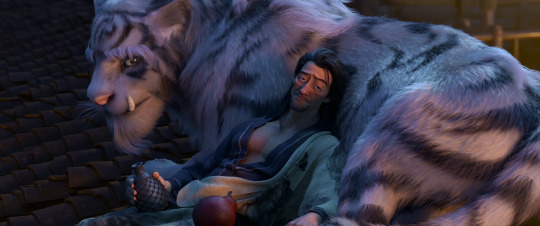
The concentric circle design of the portal resembles Ancient Chinese jade pendants from the Western Han Dynasty. The recent winter olympic medals are also inspired by the same pendants. It rotates like an armillary.

The stamp on the crate of cosmic gas is that of the White Tiger, one of the Four Symbols of the Chinese constellations, guardian of the cardinal direction of west. The same stamp was on the crates at the gas station, and the teller was servicing at "Yin window" (寅字口). Yin is the third of the twelve Earthly Branches, which correlates with the year of the tiger, hence the tiger symbol.
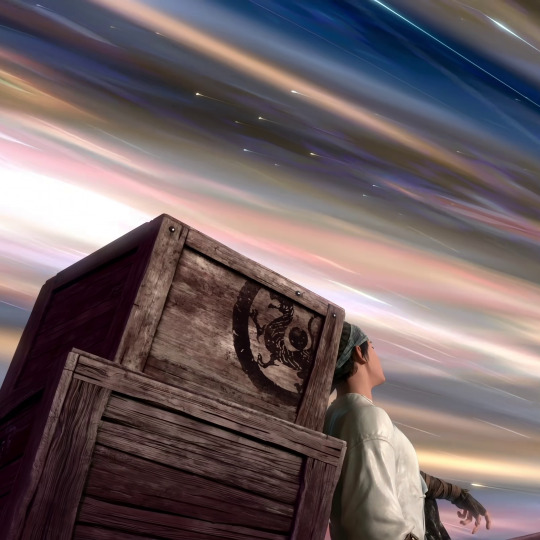

Yingzhou is based on the Yueyaquan sand dunes in Dunhuang, a cradle of Buddhism in China, located in Northwestern Gansu.

The nearby Mogao Caves famously depict murals of the Flying Apsaras, represented by Wanluo’s dance in the Yingzhou Music Hall. The song the “Ballad of the Luo River Goddess”, was written by Cao Zhi, whose poetry was greatly revered during the Southern and Northern Dynasties where the movie takes place, so the timeline checks out.
youtube
Pigsy, is that you?
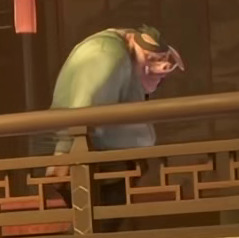
Mo Lishou mentioned that Yang Jian also used underhanded methods to capture them. This is a reference to the incident in IOTG when Yang Jian deliberately let himself be eaten by his mink, killing it from within and transforming himself into the mink to infiltrate the brothers’ hideout in order to steal Mo Lihong’s havoc umbrella.
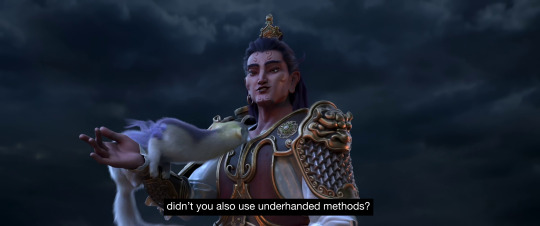
Surprisingly, Yang Jian’s title on his arrest form is still “True Monarch of the Pure Source”. His full title is the True Monarch of the Pure Source, Great Heavenly Deity of Justice (Qingyuan Miaodao Zhenjun, 清源妙道真君司法大天神), a status bestowed to him by his uncle the Jade Emperor. Ironic that the god of justice gets thrown into jail.
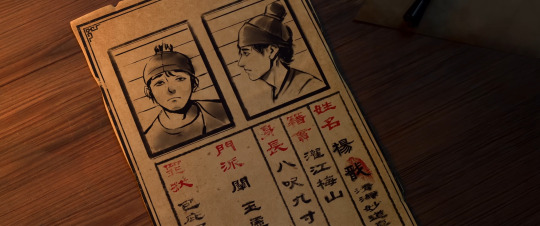
Prison gates were traditionally guarded by Bi’an (狴犴), the seventh son of the dragon king, a dragon-tiger hybrid. The one behind the pillar should be Bi’an.
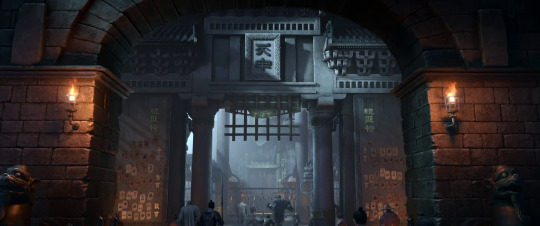
The cute bronze dragon at the bell tower is Pulao (蒲牢), fourth son of the dragon king. He is a small four-legged dragon-toad hybrid who likes to scream, and is usually represented on the tops of bells, used as handles.

He is nested on top of the Azure Dragon (青龍 Qīnglóng), another one of the Four Symbols of the Chinese constellations, representing the cardinal direction of east.
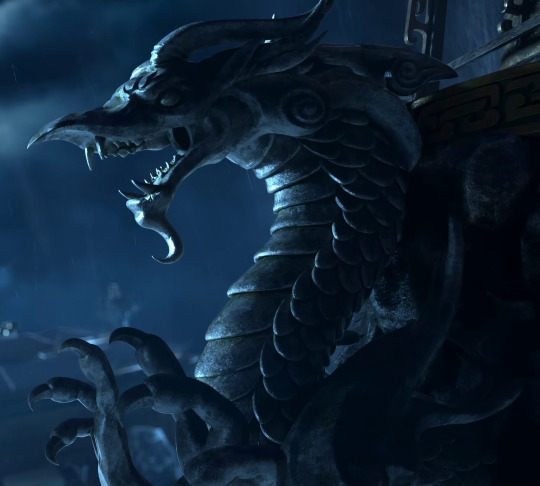

The giant beast inside the prison is Kaiming (开明兽), a mythical creature with nine heads from the abyss in Kunlun, described in the Classic of Mountains and Seas.
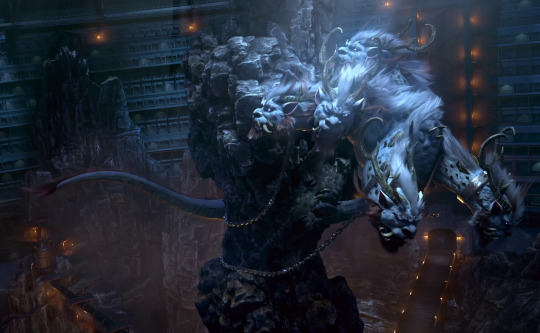

The Sword of Cutting Immortals belongs to Yuding.
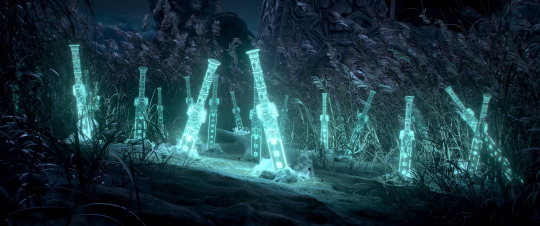
Shen Gongbao refers to Yuding as sect brother. Strictly speaking, they are indeed sect brothers as they were both Yuanshi Tianzun’s disciples from the same generation, and Yang Jian’s seniors.
Shen Gongbao quotes a line from the poem “善���行” by Cao Pi.
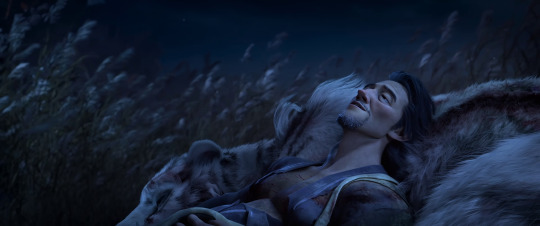
The first time we see Chenxiang’s primordial spirit manifest, it glowed green and was shrouded in smoke due to the influence of Shen Gongbao, holding a dagger and wearing a bamboo hat.
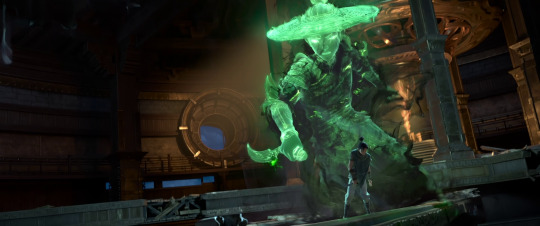
Later when he’s been around Wanluo for a time, it turned pale gold while he gained tendril-like chains, similar to Wanluo’s threads, with daggers on the ends of them.
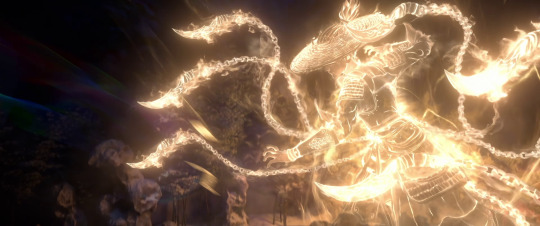
By the time he was ready to cleave the mountain after having followed his uncle around and learned Nine Turns Mystical Arts, we see the final evolution in the form of a vibrant gold figure that has lost the bamboo hat and now fully embodies a little general.
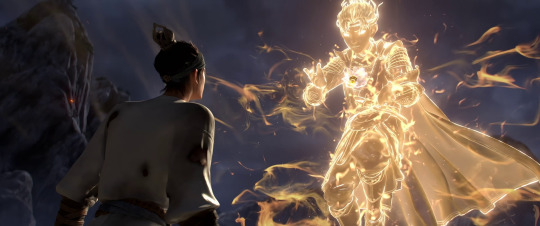
Jian drops into Chang’an, the Imperial City in the mortal realm in the midst of a civil war during the Jin dynasty. The Eastern Jin dynasty was in near-constant conflict with the northern states for most of its existence.
Chang’an, located in present-day Xi’an, has a lot historic significance as the capital of several major dynasties in Ancient China, and is a treasure trove of cultural relics.

Mount Li is a scenic location about an hour’s drive from the Fortifications of Xi’an. A complex of hot springs are located in the area known as Huaqing Pool, likely serving as the basis for Duyue Pool.
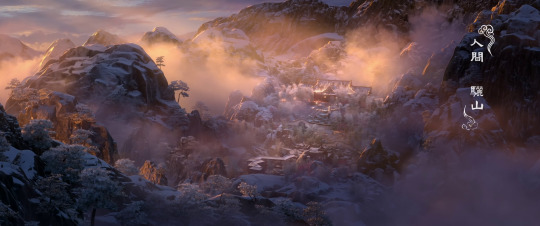
This scene is gorgeous.
Wanluo tells the story of King You of the Zhou Dynasty at the Beacon Tower of Mount Li, who was slain in 771 BC. The tower still stands today as part of the Huaqing Palace complex.

Further west is Mount Hua, the sacred mountain known as the "Western Mountain" of the Five Great Mountains of China. Lotus Peak is located on the western side of the mountain.
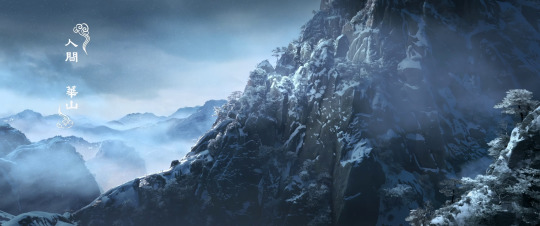
The paths leading up the mountain involve steep staircases, vertical ascents, and narrow plank trails bolted onto the cliff face, often labelled as some of the most dangerous hikes in the world.

The Nine Turns Mystical Arts (九转玄功) is the unique ability of Yang Jian. It grants him vast, physical durability of undefined limits and nigh-invulnerability to conventional weapons and various magic spells.
youtube
This was such a bittersweet moment when he stopped the wind chimes.

The scene where Chengxiang paused at Shen Gongbao’s monument was heartbreaking.

365 gods were canonized at the Investiture Altar of Mount Qi. Shen Gongbao was the last one on the list.
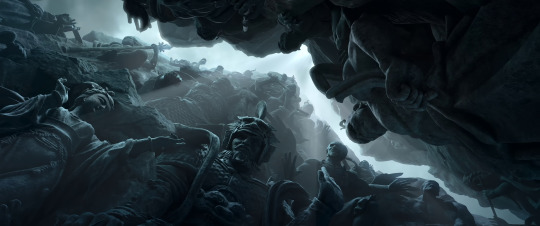
Yuding borrowed the Deity-Binding Chains from his master Yuanshi Tianzun, which were confiscated from Tu Xingsun. Tu Xingsun once used them to bind Nezha, Huang Tianhua, Jiang Ziya etc.

The Yin Yang Scroll belongs to Taishang Laojun, who along with Yuanshi Tianzun and Lingbao Tianzun make up the Three Pure Ones - three highest gods in the Daoist pantheon. In IOTG, Yuanshi Tianzun’s disciple Chi Jingzi also borrowed it to subdue Yin Hong.
The text on it comes from “Taishang Laojun’s sutra of everlasting tranquility” (太上老君说常清静经).
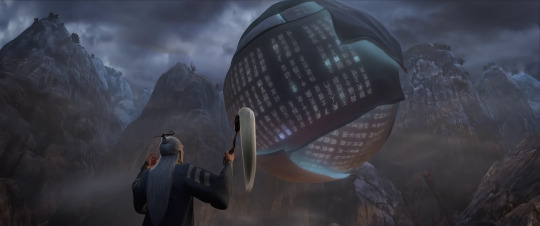
Part 1|Part 3|Part 4
#new gods#new gods: yang jian#yang jian#新神榜#杨戬#新神榜:杨戬#xin shen bang#jttw#investiture of the gods#lotus lantern#Youtube
43 notes
·
View notes